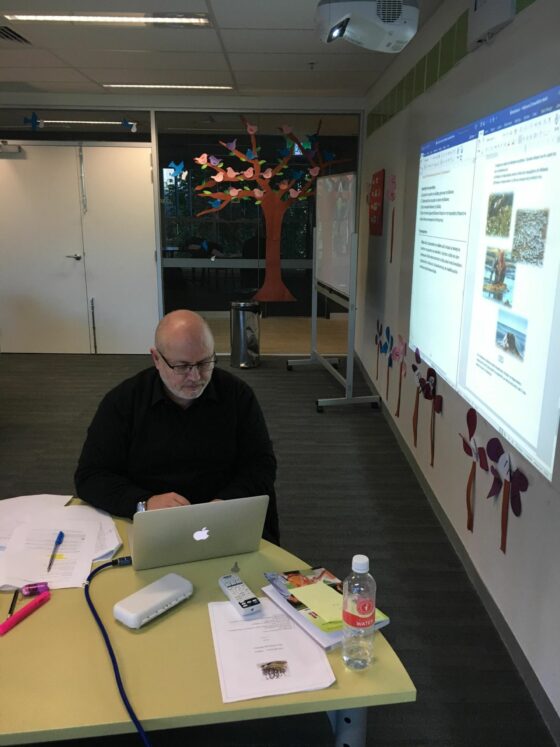“My feelings are mixed,” wrote Manos Tzimpragos in the message he personally sent to students and parents to inform them of his upcoming departure from Melbourne.
The Greek-born educator, who has served as the principal of the Greek Community of Melbourne’s Language & Culture Schools for the past 7.5 years, also served as the GOCMV’s Education Officer. His tenure is now coming to an end, despite efforts to extend it.
Those who know him speak of a man who is a mentor, colleague, friend and brother – a visionary.
He leaves Melbourne with the best of memories, heading to his appointment at the 4th Lyceum (Senior High School) of Egaleo for the new school year. “It is a new professional environment as I have not taught there in the past and I am very excited,” he said, adding that he has missed being in front of a classroom.
“That’s life,” he told Neos Kosmos. “One cycle ends, and another begins.”
The educator’s professional journey began four decades ago in June 1981, a third-year student of English Language and Literature at the National and Kapodistrian University of Athens from where he graduated before teaching at a frontistirio in Heraklion, Crete. Upon his appointment, he served in secondary education, initially as a substitute before becoming a permanent high school teacher of the English language.
READ MORE: The Greek diaspora in Australia needs educators like Manos Tzimbragos to stay

In 2007, he came to Australia on secondment for the first time through to 2011, before returning to Greece, but it was his destiny – or rather choice – to return again in March 2014 when he took on his role at the Greek Community of Melbourne’s Language and Culture Schools – a role at which he excelled, and the rest is history.
“I had a vision, and thankfully I found people with which to share it and carry it out. I wanted to give the best I could to the Greeks of the diaspora, and I don’t mean just the language but also the culture of Greece,” Mr Tzimpragos said, thanking the Community for trusting him, supporting him and his colleagues who also shared in his vision.
His post-graduate degree in technology in education came in handy during the pandemic when the community’s schools not only embraced new systems of learning but also conveyed Greek language with further gusto. So much so that even after classes returned some language learners in distant locations signed on for more programmes of this type.
Instigating programmes, such as Greek for Late Beginners, and other conversational classes, Mr Tzimpragos has played a role in keeping language alive in the Antipodes. The ELA programme which began late last year reasserts Mr Tzimpragos’ belief that the younger students come in contact with the Greek language and traditions the better and more likely they will be to keep them alive. He speaks of many innovative programmes such as “Sounds Greek” in collaboration with Monash University, “Cineνοηση” – subsidised by Greece’s Ministry of Culture to create a film on matters which have to do with school life including bullying, mutual respect; the MeWe theatrical collaboration between a troupe in Athens and Bentleigh students to create a short film.
READ MORE: La Trobe and GCM collaborate to offer PhD scholarship on Greek language learning

“It is imperative that all of us who teach Greek create a common front because that is the only way for us to deal with the many challenges. It is not a matter of increasing enrolments in the short-term,” he said, pointing to a long-distance race where Greek language learning will come out a winner.
“Another problem is the lack of educators in recent years, something which makes the constant and multifaceted education of those who already exist even more important,” he said.
Those who know Mr Tzimpragos, who have worked with him, the parents and students, speak of a gentle intellectual, an educator with patience and passion.
“I remember the emotion I felt when I first came on secondment as an educator and encountered students dressed in Greek traditional costumes,” he said, and he was hooked from the students’ first ‘kalimera’.
Adaptation from an interview with Maria Kampyli







